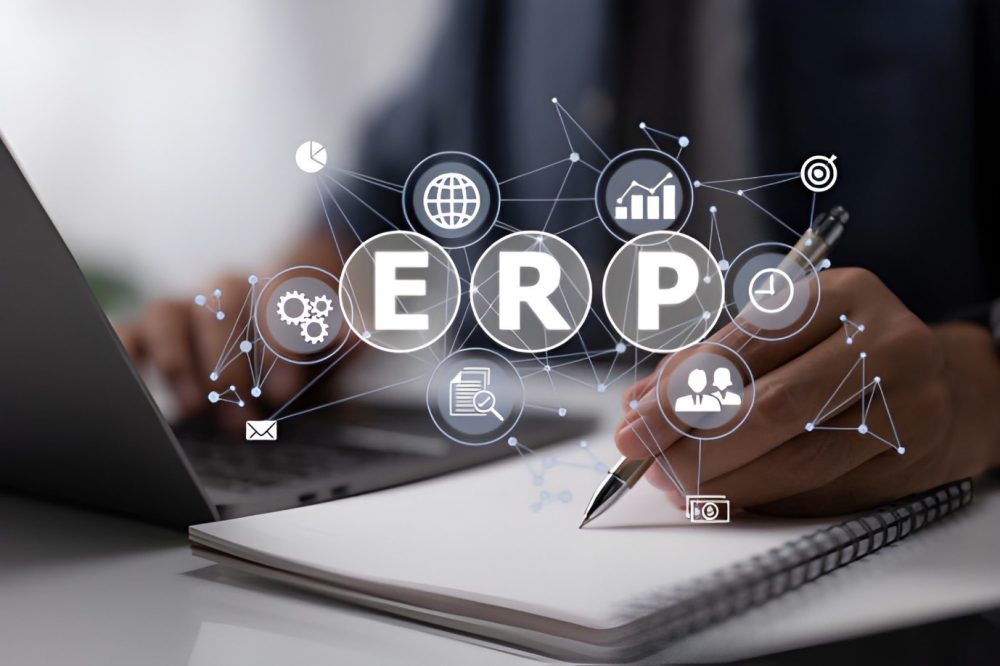In the world of that modern business environment, which is incredibly dynamic and fast-moving, it is no longer a luxury to manage financial operations efficiently, but it is the key to growth and survival. The adoption of sophisticated technologies to facilitate the financial processes, guarantee compliance, and improve decision-making is becoming more popular among many companies in Saudi Arabia. An ERP financial management system is one of the greatest tools to accomplish this. ERP systems provide businesses with the ability to automate operations, obtain real-time data, and ensure proper financial accounting by consolidating different financial operations into one platform. ERP solutions such as Quickdice ERP provide organizations with strategic benefits in the case of organizations that seek to enhance efficiency and transparency.
In the recent call to promote digital transformation in the Kingdom, particularly the adoption of E-Invoicing Adoption in the Kingdom, businesses require the facilities that can easily accommodate e-invoicing, automate compliance, and deliver proper reporting. An ERP system in Saudi Arabia, including Quickdice ERP, not only provides the e-invoicing compliance, but also streamlines the overall financial management. Businesses are able to minimize errors, enhance cash flows and make data-driven decisions that drive expansion. We will discuss nine major ways in which ERP systems can help to improve financial management.
Here are some of the 9 ways ERP improves financial management in companies.
1. Centralized Financial Data
ERP system has brought all financial information into one platform, which acts as a single platform of truth to an organization. Conventionally, the financial information is distributed in different departments and thus creating discrepancies, late reporting, and inefficient procedures. Having an ERP system in financial management allows firms to centralize the data like accounts payable, accounts receivable, payroll data and general ledger entries. This centralized system can guarantee that business people have the correct and current financial information in their fingertips. In the case of Saudi companies that are adopting E-Invoicing in the Kingdom, the centralization of data is useful to ensure that all departments remain consistent and compliant. Quickdice ERP is a good solution in delivering this centralized platform and facilitating smooth financial tracking and reporting.
2. Financial Processes, Automation.
Financial processes done manually are subject to mistakes, time-consuming, and resource-intensive. ERP systems are used to automate some of the most important activities such as invoicing, expense tracking, payment processing and reconciliation. This automation eliminates the mistakes of manual procedures, accelerates the process and enables financial teams to concentrate on strategic involvement and not the said of routine. In the case of companies in Saudi Arabia, the e-invoicing processes can be automated with the help of an ERP system in Saudi Arabia such as Quickdice ERP in order to enable the companies to adhere to the current regulations and not to face any penalties. Agility and responsiveness Businesses become more responsive in that automation is not only more efficient but facilitates better overall financial control.
3. Real-Time Reporting and Real-Time Analytics.
ERP systems allow using real-time access to financial data, which allows organizations to produce instant reports and conduct in-depth analytics. Real time reporting will enable the CFOs and financial managers to determine trends, performance and make timely decisions. This allows businesses to track cash flow, revenue, expenses and profitability indicators at all times with built-in dashboards. In the case of E-Invoicing Adoption in the Kingdom, real-time analytics would make sure that each invoice is compliant and recorded correctly. Quickdice ERP has powerful reporting capabilities that give companies an insight on financial health, enabling organisations to take proactive decisions, instead of responding to issues when they occur.
4. Better Budgeting and Forecasting.
Effectual budgeting and forecasting is based on precise financial information. ERP systems have the ability to enable the development of accurate budgets through the analysis of past data and recent financial patterns. Companies are able to predict the cash flow, invest and allocate resources effectively. In the case of corporations in Saudi Arabia, an ERP system in Saudi Arabia with the addition of E-Invoicing Adoption in the Kingdom would make all transactions transparent and therefore easier to predict. Quickdice ERP enables businesses to model various financial situations, which provides the management with a chance to be ready to meet uncertainty and promote sustainable development.
5. Improved Risk Management and Compliance.
International and local financial laws determine compliance with the laws to prevent penalties and corruption of a good business image. ERP systems offer audit trail, automatic compliance checks and secure record keeping. Under the E-Invoicing Adoption in the Kingdom, companies will have to follow strict invoicing criteria and reporting. A financial ERP system also ensures that all invoices are compliant with the requirements of the regulatory body and avoids errors and penalties. Quickdice ERP has built-in compliance capabilities that facilitate the ability of Saudi firms to comply with legal requirements in an efficient manner without compromising the accounting records.
6. Better Cash Flow Management
Cash flow is the blood of any organization and proper management is paramount in keeping the business running. ERP systems also give more information on how a business owes and the payables and the general liquidity. Monitoring the profit and cost in real-time will enable firms to maximize their cash flows, prevent shortages and invest strategically. The E-Invoicing Adoption introduced in the Kingdom helps companies to enjoy the advantages of ERP systems such as Quickdice ERP that allow them to receive automated payment notifications, simplify collections, and enhance the overall financial stability. Improved cash flow management is a way of ensuring that companies are able to cover the liabilities as also to exploit areas of growth.
7. Proper Cost Control and Expenses Management.
The availability of information about the expenditure and sharing of costs is key to profitability. ERP systems provide comprehensive analytics of expenses, cost centers and use of resources. Companies can determine where they are spending heavily, cut down budgets and introduce cost saving strategies. The combination of expense management and invoicing in the case of E- Invoicing Adoption in the Kingdom guarantees that all the financial activities are followed and adhered to. Quickdice ERP allows organizations to keep track of expenses on a real time basis, cut down on waste and achieve greater financial efficiency.
8. Scalability of Business Growth.
The financial management systems used by companies have to be scalable as companies grow. ERP systems have a feature of accommodating growth without necessarily having to overhaul the entire system to support more users, departments and more functionalities. An ERP system in Saudi Arabia such as Quickdice ERP can be used by businesses in Saudi Arabia planning to scale their operations or adopt the use of E-Invoicing in the Kingdom. Its flexibility in incorporating new modules and processes has been assuring the seamless management of financial matters, irrespective of the organization size and complexity.
9. Data-Driven Decision-Making
ERP systems have the ability to facilitate data-based decisions, and this is one of the greatest benefits of such systems. ERP systems enable the management to make strategic decisions about investments, budgets and resource allocation by enabling them to have access to real-life financial data. By using E-Invoicing Adoption in the Kingdom, companies are able to analyze trends in compliance, revenue and expense behavior to drive strategic planning. Quickdice ERP has better analytics, which enable organizations to make decisions based on sound data and not on feelings and improve the financial performance and eventual success.
Conclusion
Incorporating an ERP system for financial management is not just a technology upgrade—it’s a complete transformation in how a business operates. By centralizing financial data, automating tasks, improving compliance and offering real-time visibility, ERP systems empower organizations to make strategic decisions faster and with greater confidence. For Saudi companies navigating the country’s evolving digital economy, adopting an ERP system in Saudi Arabia has become an essential step toward efficiency, accuracy and long-term success.
To companies that are looking to improve efficiency, cash flow, cost control and make informed decisions, an ERP system implemented in Saudi Arabia is a strategic investment. Quickdice ERP is an outstanding system that does not only facilitate compliance with e-invoicing, but also makes financial management a more proactive and data-driven operation. Using ERP technology, companies are able to experience sustainable growth, regulatory compliance and better overall financial performance.



